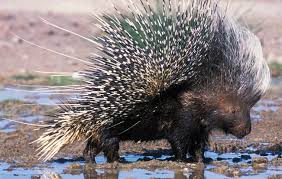porcupine
英 [ˈpɔː.kjə.paɪn]
美 [ˈpɔːr.kjə.paɪn]
- n. [脊椎] 箭猪,豪猪
- n. (Porcupine)人名;(英)波库派恩
星级词汇:

中文词源
porcupine 豪猪,箭猪
来自古法语porc-espin,豪猪,刺猪,来自porc,猪,词源同pork,espin,刺,矛,词源同spine.
英语词源
- porcupine
-
porcupine: [14] The porcupine is etymologically a ‘spiny pig’. Its name was coined in Vulgar Latin as *porcospīnus from Latin porcus ‘pig’ (source of English pork) and spīnus ‘spine’. It came to English via Old French porc espin. It underwent all sorts of traumas (portpen, porpoynt, porpentine – the form used by Shakespeare: the ghost of Hamlet’s father speaks of the ‘quills upon the fretful porpentine’ – porkenpick, porpin, etc) before finally settling down in the 17th century to porcupine, and around 1700 the fanciful variant porcupig was coined.
=> pork, spine - porcupine (n.)
- c. 1400, porke despyne, from Old French porc-espin (early 13c., Modern French porc-épic), literally "spiny pig," from Latin porcus "hog" + spina "thorn, spine" (see spine). The word had many forms in Middle English and early Modern English, including portepyn, porkpen, porkenpick, porpoynt, and Shakespeare's porpentine (in "Hamlet").
权威例句
- 1. A porcupine is covered with prickles.
- 箭猪身上长满了刺.
- 2. A little porcupine made a house by the side of the river.
- 小刺猬在小河边上造了一幢小房子.
- 3. One of the sharp hollow spines of a porcupine or hedgehog.
- 豪猪或刺猬身上硬而中空的保护刺.
- 4. There is a philosophy parable, call philosophy of porcupine.
- 有一个哲学寓言, 叫豪猪的哲学.
- 5. It is the Kookaburra ( Porcupine ) and Skunk Kingdoms that greet you today.
- 今天是笑翠鸟 ( 豪猪 ) 和臭鼬王国向你们问候.
